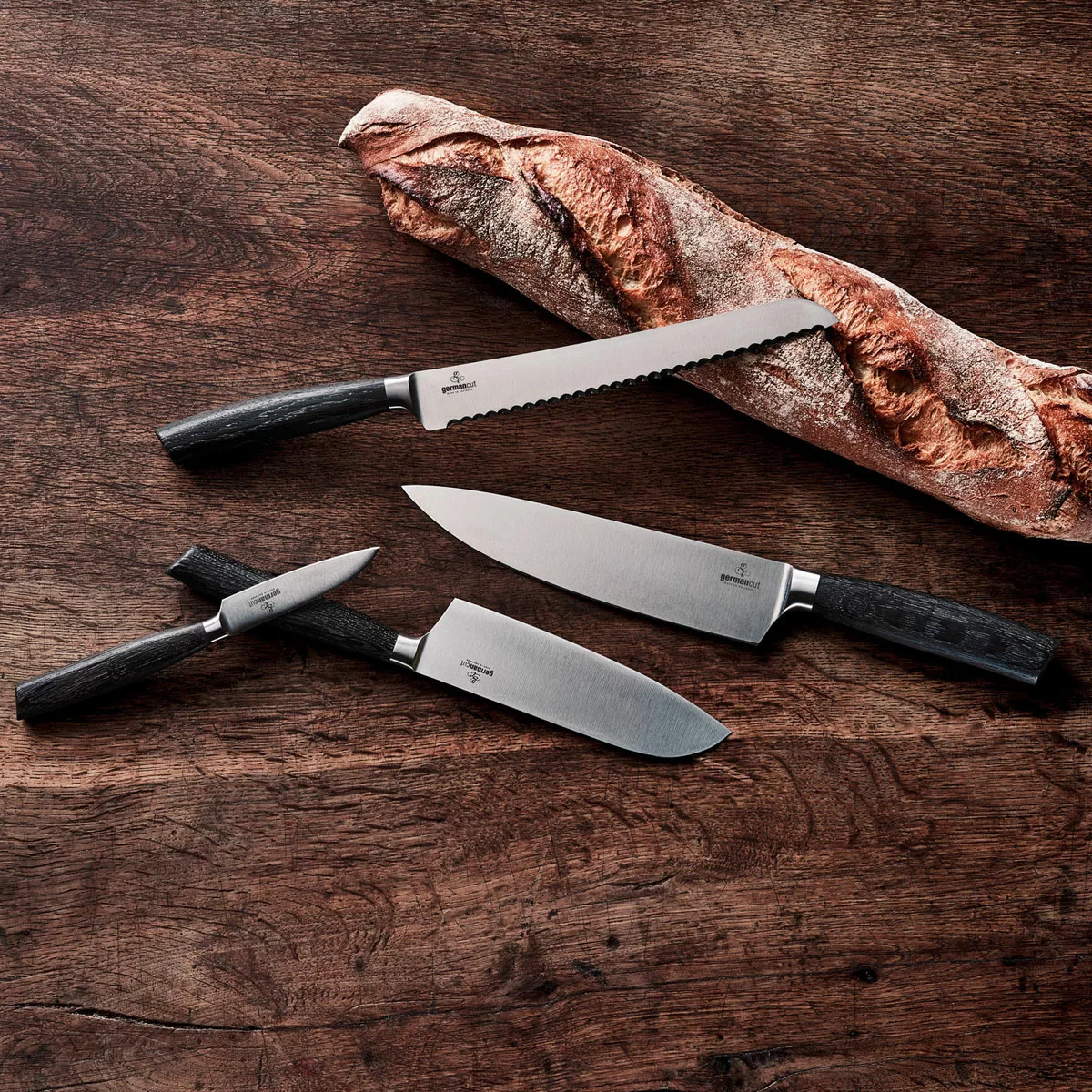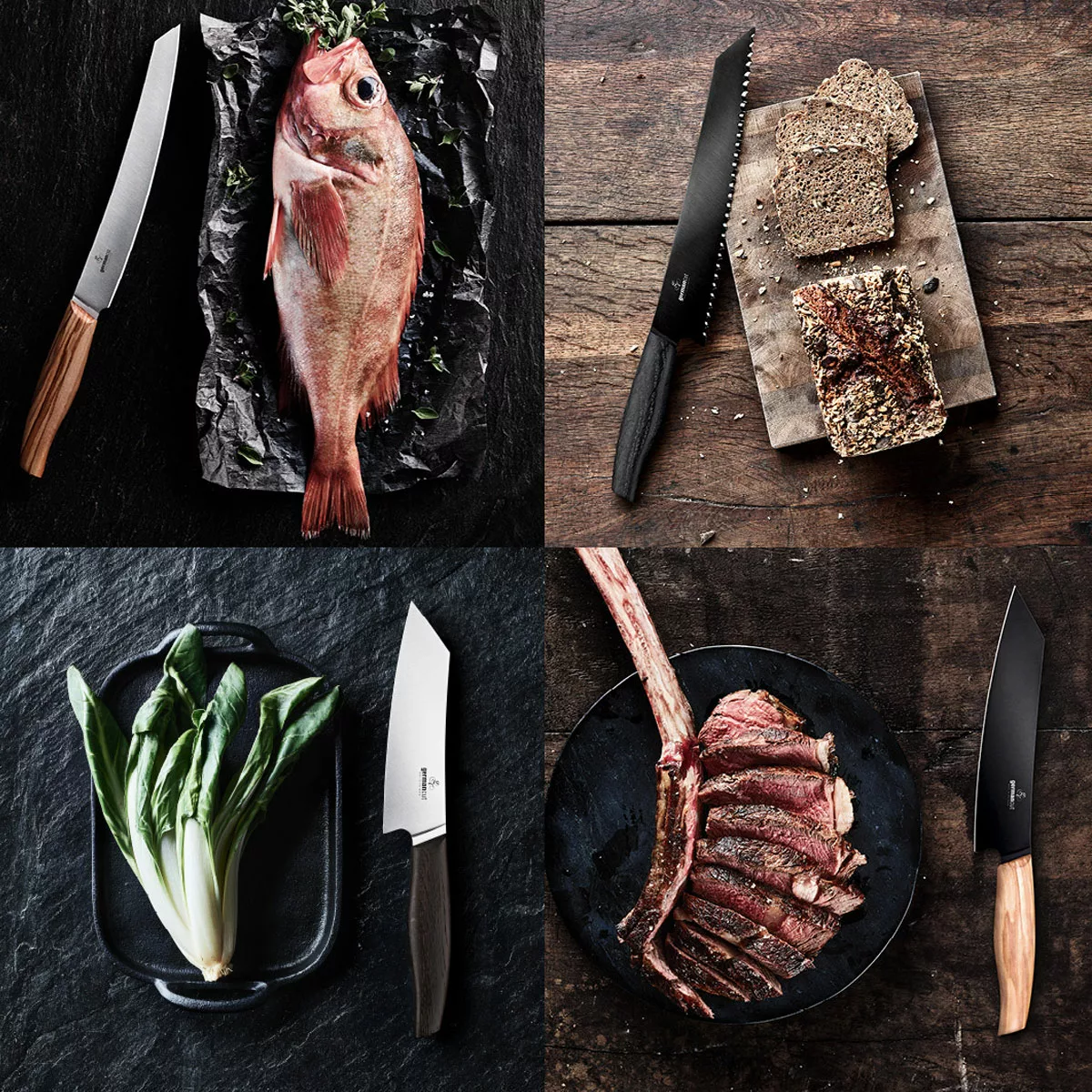
Chef’s knife F.A.Q. –
Frequently asked questions about knives
A good chef’s knife makes life easier! Whether you are a private hobby chef or a professional in a starred kitchen – the right kitchen knife is essential. But finding the right knife for your needs is not that easy.
Find out here what types of kitchen knives there are, what you should look out for when buying them and how you can enjoy your knife for as long as possible by using it correctly!
What types of kitchen knives are there?
There are many different types of knives for many different needs. We will give you a brief overview of the most important chef’s knives that no kitchen should be without:
Classic chef’s knives (such as our MEATLOVER): The all-rounder for every dish is an absolute must-have and the perfect starter for all cooking enthusiasts. Whether meat, vegetables or herbs – you can chop anything with it!
Vegetable knife (such as our VEGGIELOVER): With the slightly shorter blade of the paring knife, you can easily cut through any type of fruit and vegetable and shape it as desired.
Bread knife (such as our BREADLOVER): The shape of the bread knife will be familiar to most people: The sharp serrated blade gets through any baked goods with just a few movements – but especially or only if there is a so-called double-sided serrated edge.
Filleting knife (such as our CHEFSLOVER): The extra-long knife is perfect for filleting any fish or meat.
Office knife (such as our PARINGLOVER): The office knife, also known as a paring knife, is particularly suitable for fine and delicate work in the kitchen. The small blade allows you to cut and peel with particular precision.
How can I prevent my kitchen knife from becoming blunt?
Nobody really needs a blunt knife. But what can you do to keep your new kitchen tool sharp for as long as possible?
Cleaning: Always clean the knife by hand with lukewarm water. Never put the knife in the dishwasher, as this can severely damage the blade.
Storage: Also make sure you store your chef’s knife correctly. A cutlery drawer, for example, offers many dangers for a knife blade without suitable protection. We therefore recommend using a sheath (such as our GERMANCUT Leather sheath) or a knife block (such as our GERMANCUT knife block), to protect the knife from possible damage.
Correct carpet pad: But it’s not just cleaning and storage that can dull knife blades. The right surface for cooking is also essential to keep your knives sharp for as long as possible. Wooden boards (such as our GERMANCUT cutting board) are particularly suitable as they are naturally antiseptic and at the same time gentle on the knife blade.
How and how often do I sharpen my kitchen knife?
Grinding service: If you are not sure which tool is best for sharpening your knives and at which angle, you can also go to a professional. However, this is often associated with high costs.
Sharpening steel: The sharpening steel is an easy-to-use rod on which knives are honed to smooth and straighten their blades. The cutting edge is maintained and slightly sharpened at the same time.
Grinding stone: The main function of a grinding stone (such as our Shapton whetstones) is purely to sharpen knife blades. It is more effective than a sharpening steel, but also somewhat more complicated to use.
How often knives should be sharpened: This question cannot be answered directly, as the answer depends on a variety of factors, such as the hardness of the steel. As a rule of thumb, however, knives should be sharpened every 1-2 months if used daily. If used less frequently, up to once a year is sufficient.
What should I look out for before buying?
Handle: In addition to the blade, the handle of a good kitchen knife is also crucial. After all, the knife must fit well in the hand in order to be able to work with it as efficiently as possible and without risk of injury.
Origin: The origin of the blade does not necessarily have to say something about the quality. Blades from the so-called “blade city” of Solingen, for example, have a very good reputation and usually impress with their traditional craftsmanship and incomparable sharpness.
There are a number of factors that should be considered before, during or after the purchase of a good kitchen knife. After all, this is an investment where you don’t want to make any rash decisions.
Curious? Then take a look around our GERMANCUT online store now and see our professional kitchen knives – Made in Solingen – and our high-quality accessories for yourself.
